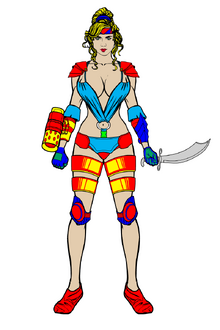
The official avatar of Anatu as used by the Assyrian government, an updated look derived from her likeness when a comic book was created for her television series, The Temple of Love.
Anatu (born December 8, 1987 as Anatu Martuenki) is a world-renowned public figure, once known primarily for her acting and her activism, who now serves as the Empress of Assyria. She ascended to the throne by public proclamation after the Televised Riots on October 9, 2016 caused the collapse of Aram, with international recognition gained through the signing of the Treaty of Buffalo a day later. Although the cultures that eventually made up Mesopotamianism have existed for millennia before her, Anatu is seen as the pioneer of the revival of Mesopotamianism, as she has taken a central role in its promotion and defence.
Anatu first became famous as a child actress, with her first role being that of an adventurous toddler in Westward (1989). She wouldn't break out until she landed the lead role in The Temple of Love in 2006, where she played Siduri, Uruk's top temple prostitute who used her influence to be the city state's main peacekeeper. As the series gained worldwide popularity, Anatu became more active as an activist, chiefly as a feminist promoting sex positivity. When her series ended in 2014, rumours floated around that Anatu would try her hand at politics, which eventually became true in 2016 when she ran for the Presidency of the Asia Minor Federation (AMF). Her campaign did well despite tepid support from her own party, the Mound Party, as her very liberal attitudes towards sex upset the starkly traditionalist Catholic culture that dominated Asia Minor. However, after the revelation that she had committed adultery in 2010, the Mound Party took the unprecedented step to remove Anatu from her candidacy, sparking riots across not just Asia Minor but also across the Near East, leading to the Televised Riots that led to the collapse of Aram, where many divisions of the Aramean Army pledged their allegiance to her. A day later, she appeared in public in downtown Nineveh to a crowd of tens of thousands, proclaiming herself as Empress of Assyria, officially replacing Aram as the predominant power in the Near East.
Early life and career
Anatu was born Anatu Martuenki on December 8, 1987 in Nineveh to Enki Benshamash (himself a well-known theatre actor originally from Ugarit) and Damkina Martuea, an alewife. An only child, Enki noted her love for attention from a very early age, and thus tried to get her into acting almost as soon as she was born. When she turned one year old, a casting director friend of Enki decided to use Anatu for a role in the movie that eventually became Westward, where she played a toddler found by the main character who inspires him to journey through the Wild West. After Westward, her roles were limited as she concentrated on her schoolwork, though she remained highly sought after as a child actress and her passion for acting grew during this stage. In an interview with the Roman Free Press, Anatu explained that as she was growing up, she desperately wanted to become a movie star, but it was her father- effectively her manager- who prevented her from getting a starring role.
"I used to get upset at him all the time at the time," said Anatu, "but, looking back, I'm glad he held me back. There are too many horror stories of child actors who weren't mature enough to handle the expectations of stardom and I didn't want to join them. I needed to bide my time."
At 14, Anatu would secure her next major role as Irina Kozlov, the daughter in the sitcom The Kozlovs. Though she was a series regular, her role diminished as the series went on. Tensions set in, and Anatu renewed her ambitions for a starring role. She had a false start when she was selected as the star for a pilot, but despite initial network support, the pilot was not picked up. She continued pressing, eventually landing on The Temple of Love.
The Temple of Love
In March 2005, Anatu filmed the pilot episode for The Temple of Love, set in ancient Mesopotamia when Gilgamesh was the king of Uruk. Initially, Anatu's role- Siduri- was meant to be a supporting role, with the actor playing Gilgamesh intended to be the star, but the producers were so impressed by Anatu's performance that they retooled the show so that she could be the star. Thus, at 18 years old, Anatu would get her first lead role, and was a hit with audiences right from the start. After the second season, Anatu would become an executive producer of the series, a first within the AMF film industry.
Siduri's role on the show was that of the temple prostitute for Uruk's chief goddess, Inanna, the goddess of war and sex. It at first became known for pushing boundaries, being the first television series filmed in the AMF to show full frontal nudity, with sex and sexual themes being a big part of the show in its early seasons. It was the first time Anatu doffed her clothes on screen, though she never found the prospect intimidating at all. "I work hard on my body," said Anatu at a press conference following the first season, "so I'm not ashamed to show it off. So I never worried about doing the nude scenes or even having sex on TV."
At first, Siduri never left the temple, with episode themes being used to explore her sexuality and her dynamics with her patrons and her duties. In some cases, she would provide the decisive advice that would allow Gilgamesh to solve whatever problem he had, eventually leading to Siduri being known as "the power behind the throne". As the series progressed, Siduri would venture out of the temple (in what producers admitted was a "necessary deviation from history") and become proactive within the community. At the conclusion of the series, Gilgamesh would suffer an illness and die in the finale, officially passing the throne on to Siduri, with Gilgamesh doing so noting her incredible popularity within the city.
The change from being solely within the temple to becoming a public figure was a contentious one for fans, a debate that Anatu took personally. She felt that the transition was necessary, as she believed her character was an analogy for the status of women within Asia Minor. "The AMF, like the vast majority of Virtue is highly patriarchal, with opportunities extremely limited for women," said Anatu in a Ankara Tribune interview in 2012. "I'm lucky that I have producers who believed in my talent and knew Siduri needed to do more than just sit around the temple, because as The Temple of Love shows, if you allow women to explore their talents and leave their rigid roles, society is better for it."
In 2014, Anatu announced the end of The Temple of Love, citing "burnout". Later that year, the series finale would air with the highest ratings globally for a series finale in television history, ending the show after 240 episodes.
Activism and political career
As her star grew during her television career, Anatu became more involved with politics, proclaiming herself a sex-positive feminist in 2010. That same year, she was the face of the "Her Body, Her Choice" campaign that advocated for the AMF to legalize abortion and female contraception, which led to the AMF to amend some of its abortion laws. The success of the campaign emboldened Anatu to pursue other campaigns, leading to rumours that she would eventually run for President.
In 2015, Anatu formally announced her intentions to run for the AMF Presidency, seeking the nomination for the Mound Party, one of the AMF's two major parties (the other being The Bearers of the Cross, who are less progressive that the moderate Mound Party). She ran on a platform promoting sexual liberation, as well as a promise to run a "no-nonsense" government that "focused on the real issues". Despite her lack of political experience, Anatu displayed real depth and knowledge of AMF politics and within her policy proposals, and never did look out of place while campaigning. Her lack of political experience would show when speaking off the cuff, as she would at times utter blunders that left pundits wondering about her quick thinking abilities. Nevertheless, she displayed an ability to adapt, with her receiving praise for her quick learning.
She would rise in the polls as 2016 rolled on, but despite her popularity, her sex positive message rankled Mound Party elites and many others in the upper echelon of Asian society. The Mound Party made frequent attempts to remove her from her candidacy both during and after she secured victory in the primaries, with the Mound Party going so far as to amend their party rules stating in order for her to receive her party's nomination, the party elites had to vote for her, which they inevitably did.
The Pontus Chronicler tapes and rise to the Assyrian throne
On September 16, 2016, when Anatu led her challenger by as many as ten percentage points in public polling, The Pontus Chronicler released a photo showing her holding hands with businessman John Razos, whom the Chronicler asserted was married. After initially asserting they were just friends, subsequent stories by the Chronicler where Razos' wife claimed she caught John and Anatu kissing forced Anatu to film a video released to the media where Anatu came clean about her relationship with Razos. In the video, she asserts that she met Razos at the docks in Sinope and spent one night together at her suite she rented while in the city. "We had sex that night, yes," said Anatu in the video, often trying to hold back tears. "I would like to reiterate, though, that Mr. Razos misled me about the nature of his relationship with his wife, as it wasn't until after we had sex did I learn that he was actually married, and not 'dating' as he had asserted. My heart was torn as John told me his story, but
